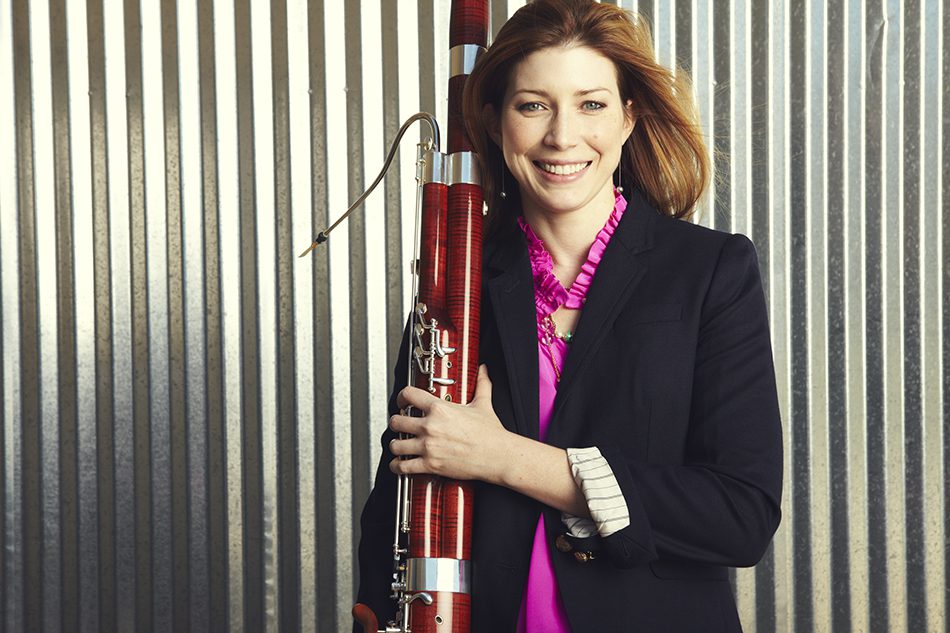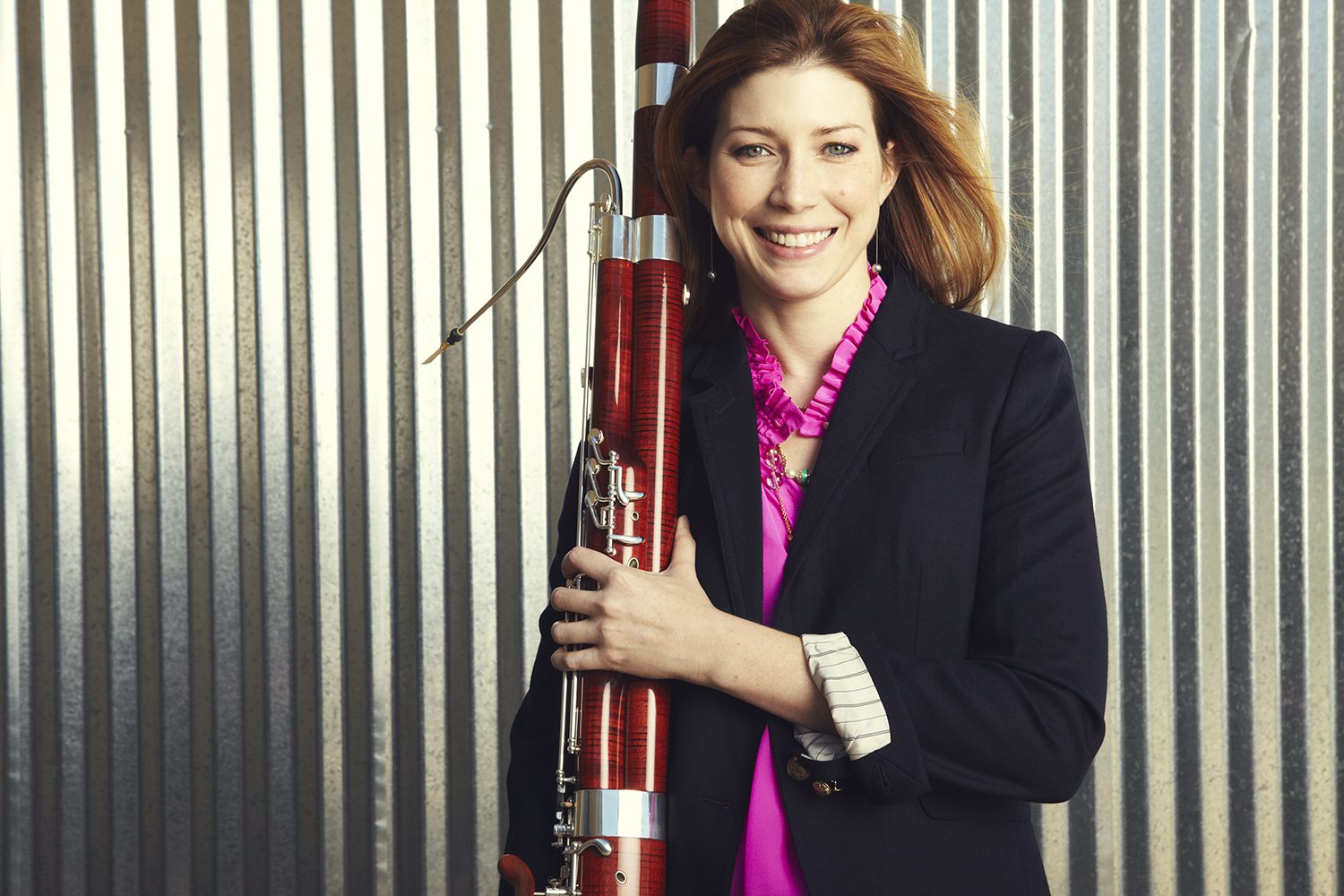Music and mentorship

Ann Shoemaker ’02 was 12 when she first saw the love of her life. She had a 12-year-old’s reaction.
“I had no idea what (a bassoon) was,” she said. “My elementary school band teacher showed me a picture of it, and I thought it was really funny looking but thought, sure, why not. I’ll give it a try.”
Good call. Today, Shoemaker is a renowned master of the woodwind instrument and on the fast track to tenure at the Baylor University School of Music, barely a decade after earning a Bachelor of Music degree from Furman.
“We have a lot of shining stars out there that come through here, but the fact that she has risen, at least in her teaching world, to the top of that rank pretty quickly at a school like Baylor is really impressive,” Furman Music Department Chair Mark Britt said. “A lot of folks may not make it to those schools for quite a while in their career.”
Shoemaker has performed as a soloist, chamber musician, and in orchestras across the United States and in Europe, including at the InterHarmony International Music Festival in Italy, and is currently the principal bassoonist with the Shreveport (LA) and Waco (TX) symphonies, while substituting with other orchestras when she gets the chance.
This fall, she plans to tour with pianist and fellow Furman alum Chuck Dillard ’98, and it’s not likely she’ll ever find gigs in short supply.
“There are a lot of fantastic bassoonists out there, but it’s certainly less common than the violin or trumpet or flute or something like that,” Shoemaker says, “so if you’re a pretty good bassoonist you’re usually in pretty high demand.”
Mastering an instrument is fundamentally a highly personal endeavor, but it’s the synergy between the bassoon and the rest of the ensemble she likes most.
“(The bassoon) is a constant challenge. I don’t think I’ll ever feel like I’ve mastered it or there’s not more to accomplish,” Shoemaker says. “It can drive you crazy, but I love the challenge and the interaction it provides. The bassoon isn’t really as much of a solo instrument. It’s more collaborative, and that’s what I love—chamber music and playing in the orchestra.”
Teaching is also collaborative, and it’s no coincidence Shoemaker cherishes that part of her life at least as much. “Other college professors get to work with their students for one semester, and there might be 50 people in the class. But I get my students as freshmen, and I get at least one hour that’s one on one with them every week and three hours with them total every week over the course of four years,” she says. “You get to know them pretty well and watch them learn and discover who they are, so it’s pretty cool.”
Shoemaker is about to enter her sixth year at Baylor. Before that, she was an adjunct professor at Furman after earning a Master of Music degree from Yale and a Doctor of Musical Arts degree from North Carolina-Greensboro, where she was a Hayes Fellowship recipient.
“You can’t go in a room with her and not feel comfortable, and I think that was true for the students (at Furman) too,” Britt says. “And once that comfort level was there, she could really tighten the screws and get them to become better players because they trusted her.”
At UNCG, her secondary area of study was ethnomusicology, which looks at “how music and culture relate.” During her research she found herself participating in a couple of programs she believes can make the world a better place by exposing children to music.
OrchKids, a Baltimore Symphony Orchestra program, is a model for helping underprivileged kids in the U.S., while El Sistema does the same in Venezuela. Shoemaker spent several weeks volunteering in both places in 2009 while writing her dissertation comparing the two.
“(El Sistema) was not only creating this huge, new population of children and eventually adults who love classical music, but it’s doing it in a way that helps to improve their lives. That’s what really fascinated me about it,” she said. “I have thought a lot about trying to start a program in Waco. Baylor has a great school of social work and we have a great school of music, so a dream of mine would be to form a program here that would have a collaborative effort from the two schools.”
“There’s just no question that being involved in the arts improves the quality of peoples’ lives. They’re being creative and learning to think outside the box, but they also learn discipline,” she said. “Not all of them are going to be great musicians. But they’re all learning. It’s expanding their worldview. They’re feeling connected with people around the world with this art that people for hundreds of years have shared. They’re seeing concrete examples of how they can set a goal and accomplish a goal. That seems really simple, but for a lot of kids they’re not ever really told you’re capable of doing anything you want. They just don’t know, and that translates into every aspect of their life.”
Shoemaker was born in Fort Worth, Texas, but her parents were North Carolina natives who encouraged their children to go to college there. A family tour of the University of North Carolina, Duke, Wake Forest, Davidson, and Furman wasn’t enough to keep her older brother from, somewhat ironically, choosing to attend Baylor, but Shoemaker was smitten by Furman and knew no convincing would be required to keep her in the Carolinas.
“You could tell when she was here as a student there was something special about her,” Britt said. “She’s the real deal when you hear her play and watch her teach—she’s got it going on.”
Learn more about music at Furman here.
